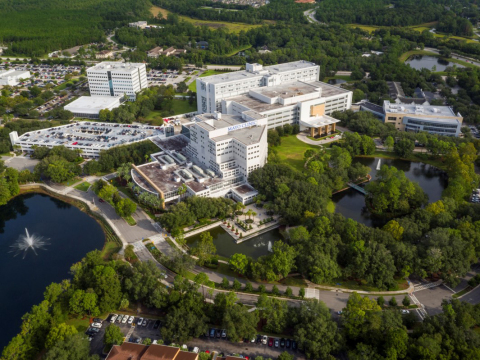- Collaboration combines the clinical expertise of Mayo Clinic and Baxter Renal Care Services
- Outpatient clinic to provide chronic kidney disease management, home dialysis and in-center dialysis services
- Project stems from five-year collaboration to advance care across different therapeutic areas
The Baxter and Mayo Clinic’s new renal care center of excellence is located on Mayo Clinic’s campus at Jacksonville, Florida (Photo: Business Wire)
Baxter International Inc. (NYSE:BAX), a global innovator in renal care, and Mayo Clinic today announced a new collaboration to develop a renal care center of excellence in the U.S. The center will serve patients across the continuum of renal care — from chronic kidney disease (CKD) management through transplant — and drive better patient outcomes.
The center is being established at the Mayo Clinic Dialysis Center at the campus in Jacksonville, Florida, where Mayo Clinic’s recognized excellence in care will be integrated with Baxter Renal Care Services’ proven clinical service model and CKD management program. The Mayo Clinic Dialysis Center in Jacksonville provides state-of-the-art dialysis services in a comfortable, home-like facility. The collaboration will also allow for the trial of potentially new, codeveloped products and services.
“The collaboration between Mayo Clinic and Baxter combines the best of our clinical, research and innovation expertise, and is rooted in the shared goal to improve the way we care for patients with serious and complex illnesses,” says Gianrico Farrugia, M.D., CEO of Mayo Clinic in Florida and president-elect of Mayo Clinic. “We are excited to establish this new renal care center of excellence with Baxter.”
For people with kidney disease or kidney failure requiring kidney dialysis, the Mayo Clinic Dialysis Center offers:
- Chronic Kidney Disease Clinic, where a dedicated team of providers work together to provide comprehensive care to people with kidney disorders
- Home dialysis training and support for both home hemodialysis and peritoneal dialysis
- In-center hemodialysis
- Outpatient dialysis services
- Nephrology Nutrition Clinic, where registered dieticians with expertise in kidney disorders provide ongoing guidance for nutritional needs
- Temporary dialysis if patients need treatment while traveling
Baxter Renal Care Services cares for more than 25,000 patients through its clinics across Asia, Europe and Latin America. Baxter Renal Care Services has historically worked closely with local experts to establish clinics where there is a need for centers of excellence that provide comprehensive care to help patients sequence through their therapy journey. These clinics often feature a successful CKD program focused on slowing the progression of kidney disease, as well as Baxter’s latest technologies to support patients’ clinical and lifestyle needs.
The dialysis clinic collaboration is the first launched initiative from the Baxter and Mayo Clinic five-year agreement announced in 2017, allowing the two healthcare leaders to bring together their respective clinical and development expertise. The primary emphasis of the broader agreement focuses on new research and development projects to advance innovation across different therapeutic areas where there are high unmet patient needs, such as renal disease. The initial agreement is for a five-year period, with a five-year renewal option.

No comments:
Post a Comment
Note: Only a member of this blog may post a comment.